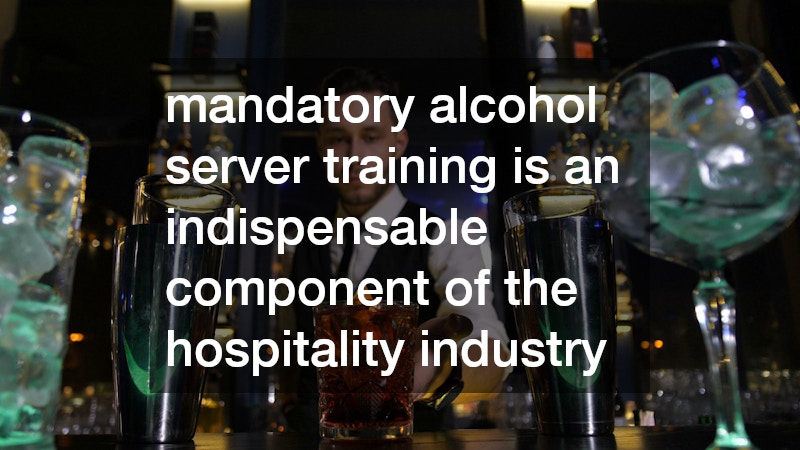The landscape of the hospitality industry has evolved dramatically over the years, with regulations continually adapting to new societal norms and expectations. One such regulation that remains crucial to businesses serving alcoholic beverages is the mandatory alcohol server training. Notably, as technology continues to penetrate almost every sector, the move towards online training modules has become increasingly prevalent. Therefore, understanding everything about online mandatory alcohol server training becomes indispensable for both employers and employees in this sector. In this article, we will explore the intricacies of this training, why it is vital, and how online platforms are revolutionizing the accessibility and efficiency of alcohol server education.
What is Alcohol Server Training?
Online mandatory alcohol server training is a structured program designed to educate individuals who serve alcohol in various settings, including bars, restaurants, and events. This training is essential in ensuring that alcohol servers understand and comply with laws that govern the sale and service of alcoholic beverages. With the growing emphasis on responsible alcohol consumption, these programs provide critical knowledge on topics such as checking IDs, recognizing signs of intoxication, and understanding legal liabilities. Online platforms have made these courses more accessible, with modules that users can complete at their own pace, reducing the logistical challenges associated with traditional in-person training. Ultimately, these online programs aim to equip alcohol servers with the necessary skills and knowledge to responsibly and legally serve alcohol.
Why is this Training Essential?
The necessity of online alcohol server training stems from the responsibilities and risks associated with serving alcohol. Serving beverages inappropriately or unlawfully can have serious legal consequences for businesses and servers alike, including fines, license revocation, or even legal action in cases of alcohol-related incidents. Therefore, training programs serve as a preventive measure, educating servers on how to identify and avoid potential violations. They emphasize likely scenarios that a server might encounter, providing guidance on handling customers who are underage, visibly intoxicated, or attempting to consume alcohol in prohibited locations. By equipping servers with this knowledge, businesses can reduce the risk of legal repercussions and enhance customer safety and satisfaction.
Beyond legal compliance, mandatory alcohol server training contributes significantly to public health and safety. Alcohol misuse can lead to accidents, health issues, and social problems, all of which can have far-reaching consequences for individuals and communities. Alcohol servers are often the first line of defense in preventing such outcomes, making their training crucial in promoting responsible consumption. Educational modules in these trainings address the physical and psychological effects of alcohol, teaching servers how to identify signs of overindulgence and intervene appropriately. By fostering a culture of responsibility and safety, these programs help reduce the negative impact of alcohol consumption on communities, benefiting society as a whole.
Furthermore, improving the quality of service through alcohol server training can significantly enhance a business’s reputation and customer experience. Customers are more likely to return to establishments where they feel safe and respected, which is facilitated by knowledgeable and attentive staff. Trained servers are equipped to handle difficult situations calmly and professionally, thereby defusing potential conflicts and maintaining a welcoming atmosphere. This level of service not only encourages customer loyalty but also distinguishes businesses in a competitive market. Consequently, investing in comprehensive server training is not just a regulatory requirement but a strategic business move that can improve profitability and brand reputation over time.
The Future of Alcohol Server Training
As technology continues to advance, so too does the potential for innovation in mandatory online alcohol server training. Emerging technologies such as virtual reality (VR) and artificial intelligence (AI) could play a pivotal role in enhancing training methodologies. Virtual reality, for instance, could provide immersive simulations that allow users to practice real-life scenarios in a controlled environment. This hands-on approach can help improve decision-making skills and increase the retention of information among participants. Moreover, AI can be utilized to personalize learning experiences, identifying areas where individuals may need additional practice and offering tailored content to address these gaps.
Another significant trend in the evolution of online alcohol server training is the increased focus on continuous education and recertification. As regulations and societal attitudes towards alcohol consumption evolve, it is essential for servers to stay updated with the latest industry standards and legal requirements. This shift towards ongoing education ensures that knowledge remains current, reducing the risk of non-compliance and fostering a culture of lifelong learning. Many online platforms now offer refresher courses and updates as part of their training packages, so servers can easily access information and keep their knowledge up-to-date without re-enrolling in extensive training programs.
Online mandatory alcohol server training is an indispensable component of the hospitality industry, uniquely positioned at the intersection of legal compliance and customer safety. Its importance will only grow as technology continues to open new doors for innovative training solutions. By embracing these advancements, businesses not only comply with regulatory requirements but also enhance their service quality and community standing. As the industry moves forward, both employers and employees must recognize the value of these programs and commit to the ongoing education necessary for fostering responsible service and consumption of alcohol. In an ever-changing legal and social landscape, such dedication remains essential to safeguarding the well-being of both patrons and service providers alike.
